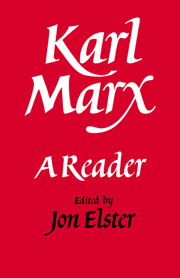III - Marxian Economics
Published online by Cambridge University Press: 05 June 2012
Summary
Marx's economic theory rests on three pillars. First, there is the labor theory of value. This is the view that the prices at which commodities exchange against each other in equilibrium can be explained by the amount of labor that has been expended, directly and indirectly, in their production. Second, there is Marx's theory of capitalism as a dynamic system. It includes, notably, the analysis of accumulation and technical change. Finally, there is the theory of the falling rate of profit. This is an argument that technical change is not only the motor of capitalist progress, but also, by virtue of its tendency to replace labor by capital, the source of its destruction.
Selection 8 includes two excerpts from Capital I, dealing, respectively, with the relation between commodity production and capitalist production, and with the relation between class struggle and technical change. Selection 9 includes several excerpts from Capital III, stating the bare essentials of the labor theory of value and of the theory of the falling rate of profit.
FROM CAPITAL I
Passage A introduces a famous device that Marx used to distinguish different economic transactions from each other, according to whether they transform money into commodities, commodities into commodities or money into money. In the following chapter (not excerpted here) Marx goes on to explain why the analysis of capitalism as M–C–M presents a puzzle: the capitalist “must buy his commodities at their value, must sell them at their value, and yet at the end of the process must withdraw more value from circulation than he threw into it at starting.” […]
- Type
- Chapter
- Information
- Karl MarxA Reader, pp. 79 - 120Publisher: Cambridge University PressPrint publication year: 1986



